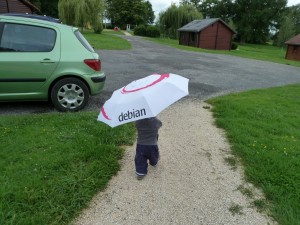This is my monthly summary of my Debian related activities. If you’re among the people who made a donation to support my work (91.44 €, thanks everybody!), then you can learn how I spent your money. Otherwise it’s just an interesting status update on my various projects.

Dpkg work
When I came back from Debconf, I merged my implementation of dpkg-source --commit (already presented last month). I continued some work on the hardening build flags but it’s currently stalled waiting on Kees Cook to provide the required documentation to integrate in dpkg-buildflags(1).
Following a discussion held during DebConf, Michael Prokop has been kind enough to setup a git-triggered auto-builder of dpkg (using Jenkins). You can now help us by testing the latest git version. Follow those instructions:
$ wget -O - http://jenkins.grml.org/debian/C525F56752D4A654.asc | sudo apt-key add - $ sudo sponge /etc/apt/sources.list.d/dpkg-git <<END deb http://jenkins.grml.org/debian dpkg main END $ sudo apt-get update && sudo apt-get upgrade
On the bug fixing side I took care of #640198 (minor man page update), #638291 (a fix to correctly handle hardlinks of conffiles), #637564 (the simplification logic of union dependencies was broken in some cases) and #631494 (interrupting dpkg-source while building a native source package left some temporary files around that should have been cleaned).
WordPress update
I released WordPress 3.2.1 in unstable (after having taken the time to test the updated package on my blog!) and fixed its RC bug (#625773). In the process I discovered a false positive in lintian (I reported it in 637473).
Gnome-shell-timer package
From time to time, I like to use the Pomodoro Technique. That’s why I was an user of timer-applet in GNOME 2. Now with the switch to GNOME 3, I lost this feature. But I recently discovered gnome-shell-timer, a GNOME Shell extension that provides the same features.
I created a Debian package of it and quickly filed some bugs while I was testing it (two usability issues and an encoding problem)
QA Work
During DebConf I met Giovanni Mascellani and he was interested to help the QA team. He started working on the backlog of bugs concerning the Package Tracking System (PTS) and submitted a bunch of patches. I reviewed them and merged them but since they were good, I quickly got lazy and got him added to the QA team so that he can commit his fixes alone. It also helps to build trust when you have had the opportunity to discuss face to face. 🙂
Vacation
That’s not so much compared to usual but to my defense I also took 2 weeks of vacation with my family. But somehow even in vacation I can’t really forget Debian. Here’s my son:

Thanks
See you next month for a new summary of my activities.

